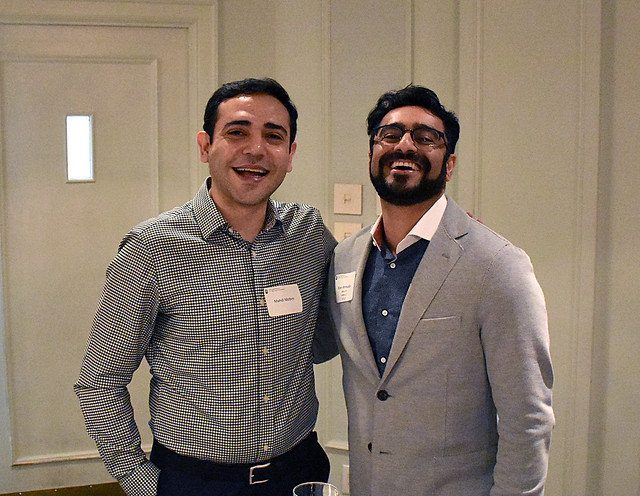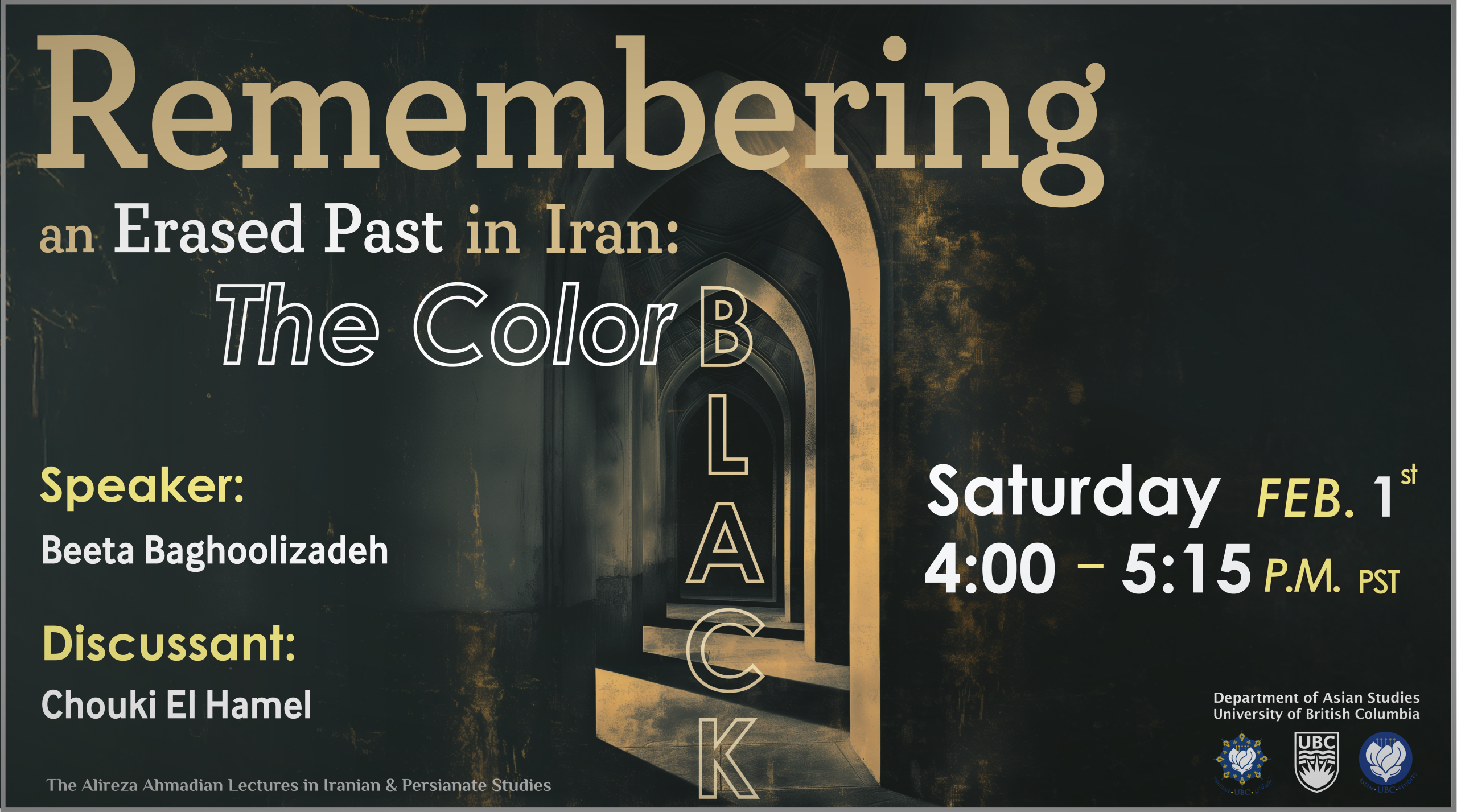The first step in the process of transformation is to listen and learn
The Department of Asian Studies stands in solidarity with Black, Indigenous, and People of Color (BIPOC) on the UBC campus, in Canada, on this continent, and around the world in their demands for an end to systemic racism and racialized violence. At this watershed moment when the deaths of Black and Indigenous people like Eishia Hudson, Breonna Taylor, Regis Korchinski-Paquet, George Floyd, and Jason Collins at the hands of police in Canada and the U.S. have brought renewed calls for justice, we commit to undertaking new initiatives to reflect on our particular connections to anti-Black and anti-Indigenous racism and, on the basis of that reflection, make necessary changes.
Our department has long been committed to examining issues of Orientalism, colonialism, anti-Asian racism, and the complicated triangulations in relations between Black, Asian, Indigenous, and white communities at particular historical moments. We have made significant progress from a faculty cohort that was majority white a decade ago to a faculty cohort that is majority POC at all levels today. However, we have fallen short in attention to Indigenous issues, and in other important areas such as the recruiting of Black and Indigenous faculty members, and the recruiting and retention of Black and Indigenous students, both undergraduate and graduate.
Recognizing our shortcomings in the area of Indigeneity, we last year voted to approve a department initiative to foreground issues around Indigeneity in Asian Studies through a transformation of our curriculum supported by public events such as a film and lecture series; now is the time to add to that a commitment to transformation that will address historic and present-day structural inequalities vis-à-vis Black communities as well.
Those of us whose academic study and teaching focuses on the various regions of Asia engage with race and Indigeneity on at least three levels:
– considering race relations and the issues of Indigenous and marginalized peoples in the countries/regions we teach about and research;
– considering configurations of race at the times and places when and where our regional disciplines were created (such as the roots of Japanese Studies in the Occupation of Japan after WWII and the subsequent Cold War; or of South Asian Studies in the British Raj) and the ways those regional disciplines have been permanently affected by those specific histories;
– considering the current structure and practices of our field in North America.
In consultation with faculty, students, staff, and other members of our community, we will actively pursue ways of incorporating these three levels of engagement toward the goal of understanding where we (as individuals and as a department) are now, how we got here, and what needs to be done in our specific context to eliminate structures, practices, and implicit beliefs that exclude and endanger Black and Indigenous people. Among our concrete actions in the immediate future will be: fundraising for bursaries and prizes directed at Black and Indigenous graduate students; pledging that at least 30% and preferably 50% of department-funded invited speakers each year are from marginalized communities; holding anti-racism and anti-oppression training and workshops with all department members, including training in anti-racist pedagogy for all TAs; further transforming the curriculum to enhance attention to racial injustice beyond our current purview, beginning with a regular seminar series in the 2020 Winter session in which we explore ways of integrating marginalized voices and histories into our current courses; reviewing department policies and practices regarding employment equity, representation, inclusion, and racial justice; and continuing to support the student associations affiliated with our department to ensure resources are available to foster safe and inclusive spaces free from discrimination and harassment. We recognize that these actions must constitute only the first stage of a comprehensive, long-term plan to promote inclusivity, equity, and anti-racist action in all aspects of our department.
In addition, we echo the sentiments in the statements condemning anti-Black racism issued by the Modern Language Association, and the Association for Asian Studies.
The first step in the process of transformation is to listen and learn. Accordingly, we here offer a short list of resources at UBC and beyond. We are also constructing a list of resources, articles, and scholarship that specifically address Black and Indigenous issues in Asia, racial injustice issues specific to Asia, or the triangulations of Black, white, and racialized Asian diasporic communities, which can be found here on this website.
Resources at UBC
- UBC Black Student Union
- Colour Connected Against Racism UBC
- QTBIMPOC discussion group – Pride Collective
- Solidarity & Action: Five Tips on Tackling Racism – Equity & Inclusion Office
Resources beyond UBC
Creating Community – Persian Language and Iranian Studies at UBC
How three Persian students initiated a new program and created a vibrant community
When Arian Zand was 19, his family emigrated from Iran to Canada. He had just finished high school. He left behind not just a community, but an entire worldview, much of it formed by the literature he’d grown up with. “I was worried about losing connection,” he says. “Persian poetry is an inseparable part of Iranian culture.”

Arian Zand. 4th year UBC Student in front of the Asian Centre.
“Part of my identity… has been informed by all of these poems, all of these stories, all of this prose, all of these narratives.”
Now in his fourth year at UBC as a political science and international relations honours student, he sees his world shifting. “Now that I’m living on campus, I’m less in touch with the Persian-speaking community [in Vancouver]. I spend a lot of time reading in English. My friends, for the most part, are non-Farsi speaking.” He knows that the less time he spends speaking and reading in his native language, the less he will understand that mindset. “My perspective of the world has been formed to a huge degree by an Iranian way thinking. Without that I think I’ll have a lot less insight into the world.”
This is why he decided to take ASIA 392 – Classical Persian Literature in English Translation in the UBC Department of Asian Studies, which he describes as “a rare and unique opportunity.”
These courses would not exist if it weren’t for the help of three Persian students who are now alumni: Negar Jalali (BA ’11, JD ’15), Bahador Moosavi (BASc ’07, MASc ’12) and Alireza Ahmadian (BA ’11).
In 2011, Asian Studies department head Ross King sought out these three students to help him create a Persian program within the department. Ross explains, “Vancouver is home to a significant and growing population of Iranian Canadians, and UBC attracts a large and growing number of students from Iran. In such a context and for the sake of improved intercultural understanding and awareness, UBC needs to be teaching Persian language and Iranian studies for its diverse student body.”
Negar, Bahador, and Alireza were all instrumental in rallying the Persian community in support of establishing a Persian language program at UBC, starting with foundational language courses and expanding to include cultural courses, like the newly offered ASIA 460 – Modern Iranian Women and Men in Narrative. The program now offers seven language and four culture courses.
“We are extremely grateful for the enthusiastic support, both moral and material, that we have received from Iranian Canadians in Vancouver—including UBC students, alumni, friends of UBC and Persophiles more generally,” says Ross. Rallying the local Iranian community in support of a common goal is just one of the benefits of the program, which Ross sees as critical to the university “because of the centrality of the Persian language, literature and literary culture for more than a thousand years to Western, Central and South Asia.” It’s become beneficial to heritage and non-heritage students alike.
Andi Jordan, another fourth-year honours student, says that “despite the fact that I’m majoring in international relations, I have had little exposure to Middle Eastern affairs and culture.” Her desire to take Classical Persian Literature was almost the inverse of Arian’s, wanting to expose herself “to different ways of thinking.”
Mobina Fathi, a second-year biology student, is taking ASIA 394 – Post-Revolutionary Iranian Cinema. Like Arian, she also immigrated to Canada from Iran, and has at times felt isolated in classrooms where she is often the only student of Persian heritage. But in this class, “I feel safe,” she says. The instructor is Persian. “He is in that community. He knows that background,” she says.
It’s that isolation on campus that Alireza wants to address. “During my education, I noticed a lack of mentors for Persian studies and Persian heritage students at UBC. This lack was in the face of a real need that I think is unique to this particular community/diaspora of UBC students,” he says. He and his alumni peers started an informal events and Facebook group, where members of the Persian community would share their experiences at UBC. Alumni groups like this are usually organized around a faculty or a specific subject, but this group was rare in that it was focused on a single culture.
The culmination of these events and meetings happened in April, when the alumni group hosted its first formal networking event. The speakers included alumni from a variety of fields.
The group’s vision is to be an active and successful Iranian UBC alumni community that’s connected across professions and industries. It’s an inclusive group—all are welcome, whether people who have Iranian ties through their heritage and language, friends, cultural and business partners, or even shared interest in Iranian culture and issues.
In the future, the group hopes to advance professional opportunities for new graduates through networking, inter-community engagement, and mentorship.
Arian is grateful to be able to take these courses connected to his heritage, an option he’s thankful to see for his Asian Studies counterparts of different heritage as well.
“It’s important to have an option to explore what your heritage can offer you. Heritage is a very broad word, encompassing philosophy, worldview, economics, politics, society, literature—all of these things,” he says. And now, like Negar, Alireza, and Bahador before him, it includes a community too.
There has never been a better time to champion Persian language and Iranian studies at UBC. Help inspire students to become innovative leaders and global citizens who understand the complex background and rich history of Iran by donating. Learn more.
Written by Joel Bentley with interviews by Areeka Riaz and Katie Hoang
Alireza Ahmadian Lectures in Iranian and Persianate Studies
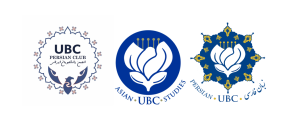
Department of Asian Studies
University of British Columbia
About the Alireza Ahmadian Lectures in Iranian and Persianate Studies:
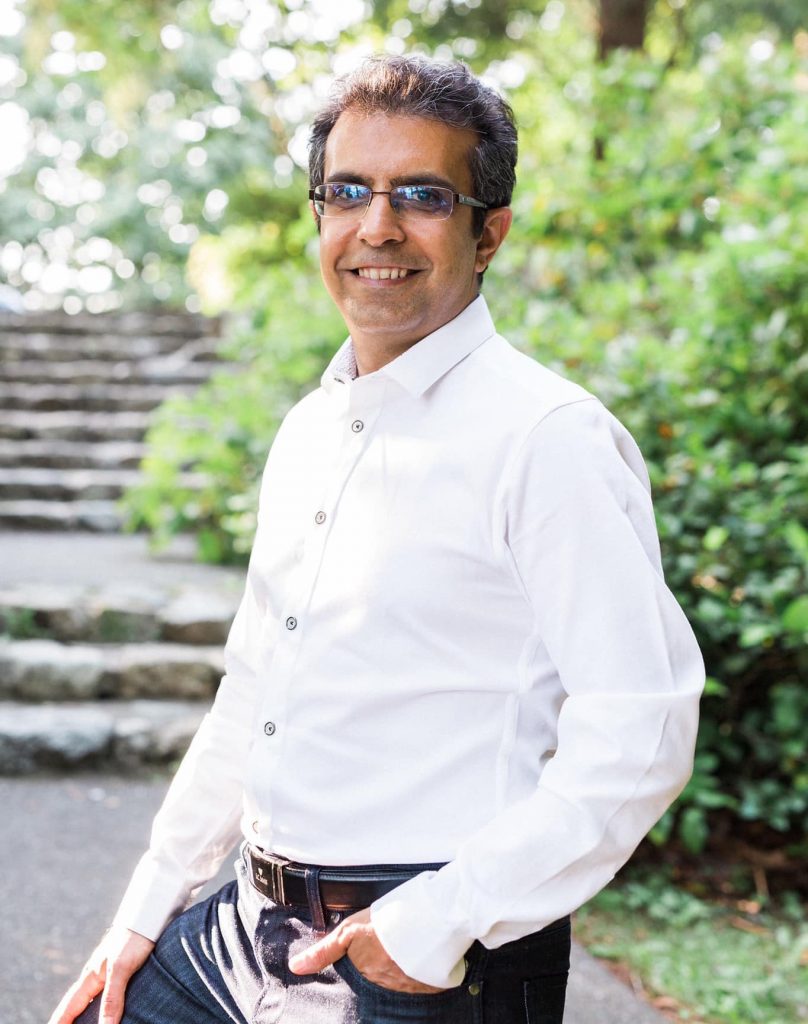 Alireza Ahmadian (1981 – 2019) was an enthusiastic researcher, a consummate socio-political analyst, and an opinion leader on foreign policy who nurtured the virtues of diplomatic dialogue and liberal democracy. Alireza was a proud and devoted UBC alumnus, supporter of UBC’s Department of Asian Studies, and beloved member of Canadian-Iranian Community. The department renamed this lecture series in his honour in 2019. Alireza’s friends in the community have provided funding to support this series, and this generous gift will see these important academic and community engagement events supported through to the end of the 2025/2026 academic year.
Alireza Ahmadian (1981 – 2019) was an enthusiastic researcher, a consummate socio-political analyst, and an opinion leader on foreign policy who nurtured the virtues of diplomatic dialogue and liberal democracy. Alireza was a proud and devoted UBC alumnus, supporter of UBC’s Department of Asian Studies, and beloved member of Canadian-Iranian Community. The department renamed this lecture series in his honour in 2019. Alireza’s friends in the community have provided funding to support this series, and this generous gift will see these important academic and community engagement events supported through to the end of the 2025/2026 academic year.
Time & Place (unless otherwise indicated): Registration for each program is held separately. All recorded times refer to Pacific Time i.e. the time it would be in Vancouver, Canada.
All events are free and open to the public.
Upcoming Lectures
Join us in fall for our next series!
Subscribe to our Alireza Ahmadian Lecture Newsletter for updates and details on how to register:
Past Lectures List
2018 | 2019 | 2020 | 2021 | 2022 | 2023 | 2024 | 2025
Saturday, April 12, 2025 (In-Person at UBC Robson Square)
Anxious Onlookers: Qajar Iran, Tipu Sultan of Mysore and British colonial expansion, 1797-1800
Speaker: Abbas Amanat, PhD | William Graham Sumner Professor Emeritus of History | Yale University
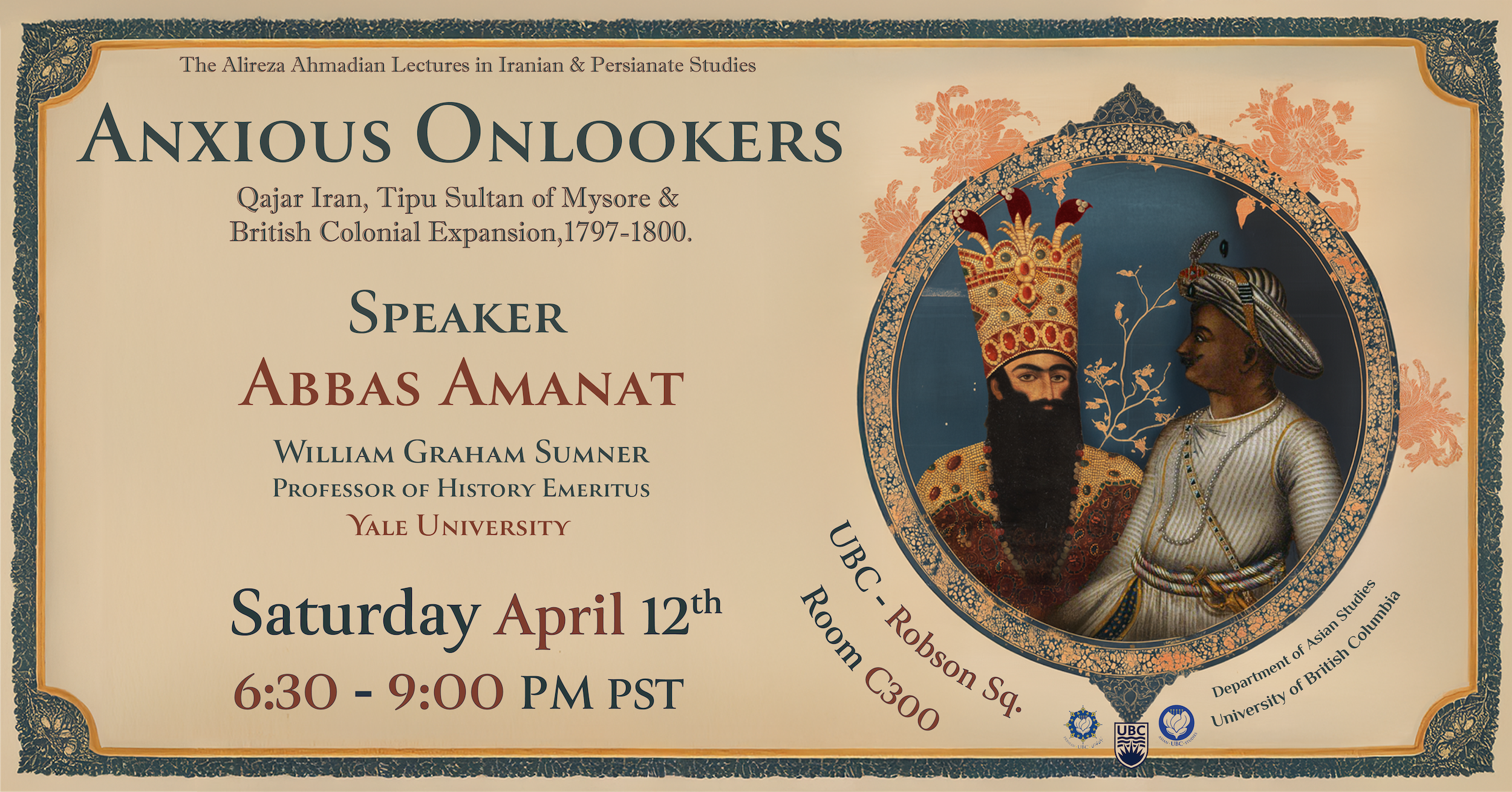
Saturday, March 8, 2025 (Online – in English)
Translating Persian, Universalizing Islam: The Case of Rumi’s “Moses and the Shepherd”
Speaker: Austin O’Malley, PhD | Assistant Professor of Persian literature | University of Chicago
Discussant: Francesca Chubb-Confer, PhD | Visiting Assistant Professor | Oberlin College and Conservatory

Saturday, February 22, 2025 (Online – in English)
Debating Islam at the Court of the Great Mughal
Speaker: Usman Hamid, PhD | Assistant Professor of Religious Studies | Northwestern University
Discussant: Sajjad Nejatie, PhD | Assistant Professor of History | University of British Columbia Okanagan
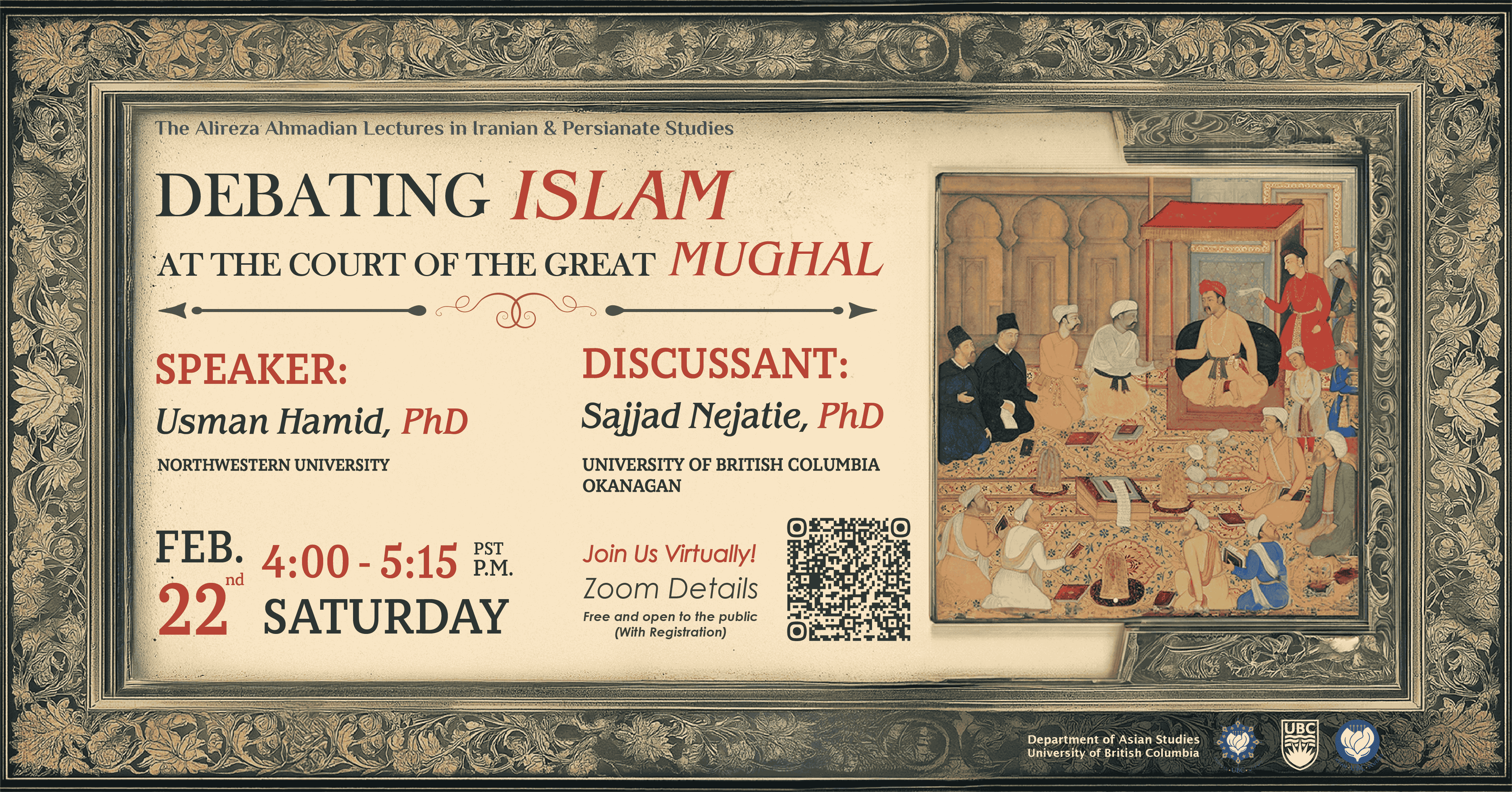
Saturday, February 1, 2025 (Online – in English)
Remembering an Erased Past in Iran: The Color Black
Speaker: Beeta Baghoolizadeh, PhD | Associate Researcher Scholar | Princeton University
Discussant: Chouki El Hamel, PhD | Professor | School of Historical, Philosophical and Religious Studies | Arizona State University
Saturday, January 18, 2025 (Online – in English)
Rumi’s Misogyny, Racism, and the Limits of Mystical Knowledge
Speaker: Mahdi Tourage, PhD | Associate Professor | King’s University College at the Western University
Discussant: Abolfazl Moshiri, PhD | Postdoctoral Research Fellow and Lecturer | Department of Near and Middle Eastern Civilizations | University of Toronto
Saturday, October 19, 2024 (Online/In-Person at UBC Robson Square – in Persian with English subtitles)
What Did the People of Iran Laugh About for 50 Years?: The Social, Cultural, and Political Role of Towfigh Satirical Paper
Speaker: Abbas Towfigh, PhD | Editor-in-Chief of Towfigh Satirical Paper

Saturday, September 28, 2024 (Online – in English)
The Making of Persianate Modernity: Language and Literary History between Iran and India
Speaker: Alexander Jabbari, PhD | Assistant Professor | Asian and Middle Eastern Studies | University of Minnesota
Discussant: Hasan Siddiqui, PhD | Assistant Professor of South Asian History | UBC
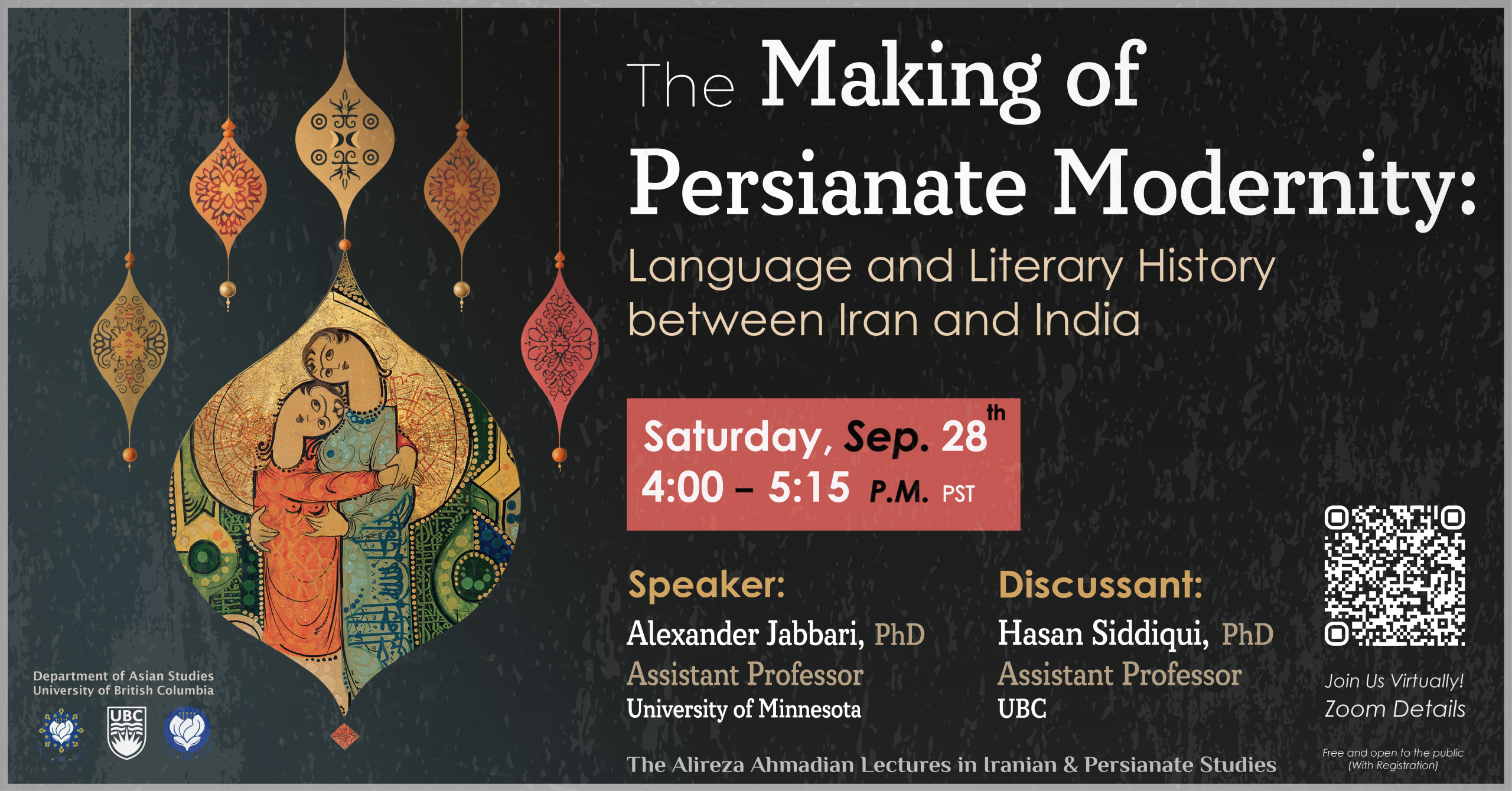
CANCELLED
Saturday, April 20, 2024
Onomastic Reforms: Family Names and State Building in Iran
Speaker: Houchang Chehabi, PhD | Professor Emeritus of International Relations and History | Boston University
Discussant: TBD
Friday, April 5, 2024 (In-Person at UBC Robson Square – in English)
“Two Hearts / Two Solitudes”: Jahan Malek Khatun’s and Forugh Farrokhzad’s Proto-Feminist Self-Defense in Medieval and Modern Iran
Speaker: Domenico Ingenito, PhD | Associate Professor of Iranian Studies and Persian Literature | Department of Near Eastern Languages & Cultures | UCLA
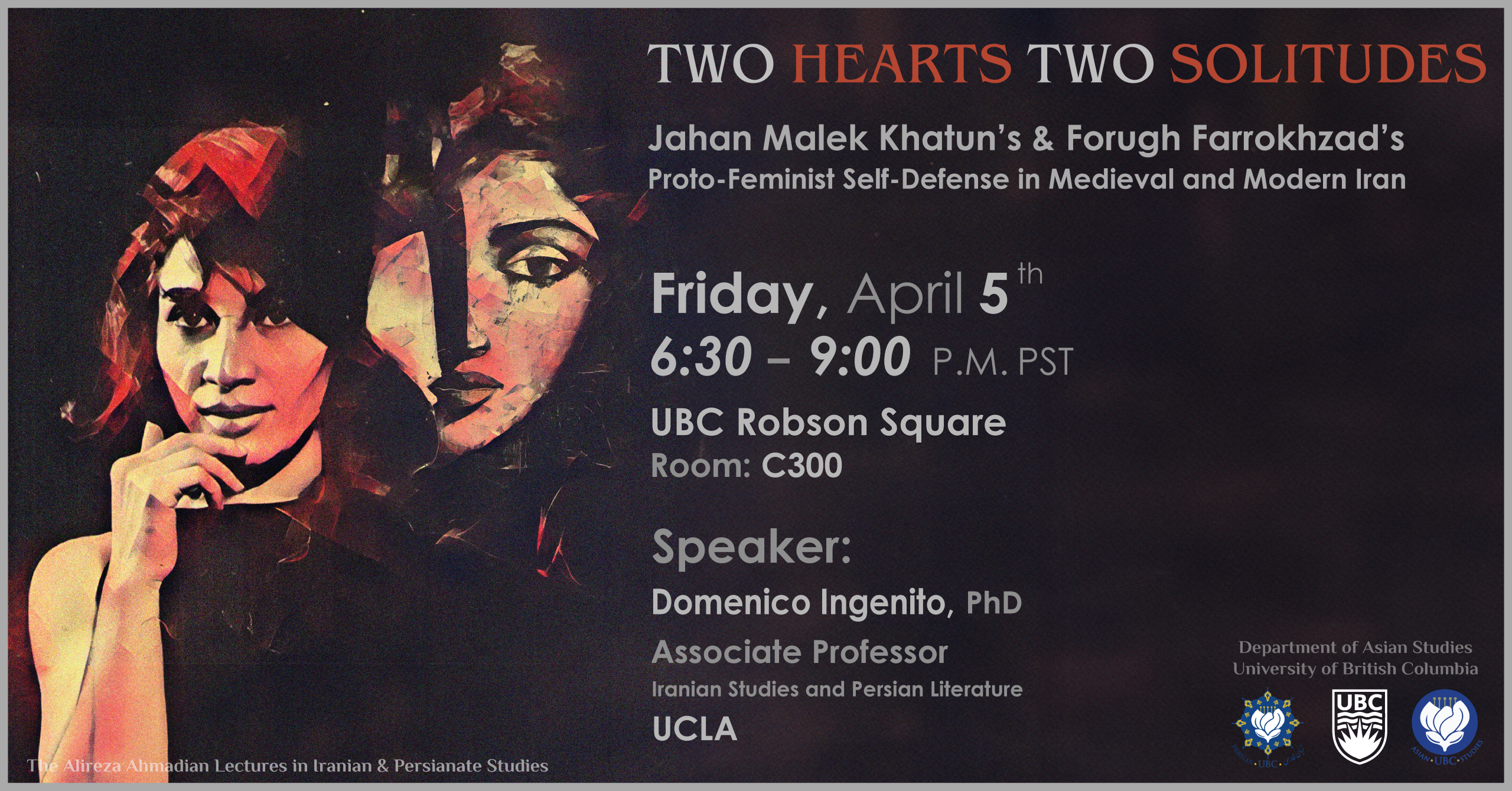
Saturday, March 2, 2024 (Online – in English)
Twelver Shiite Martyrologies in Turkic: The Politics of Translation and Ritual in Early Modern Iran
Speaker: Ferenc Csirkés, PhD | Assistant Professor of History | University of Birmingham
Discussant: Kathryn Babayan, PhD | Professor of History | University of Michigan
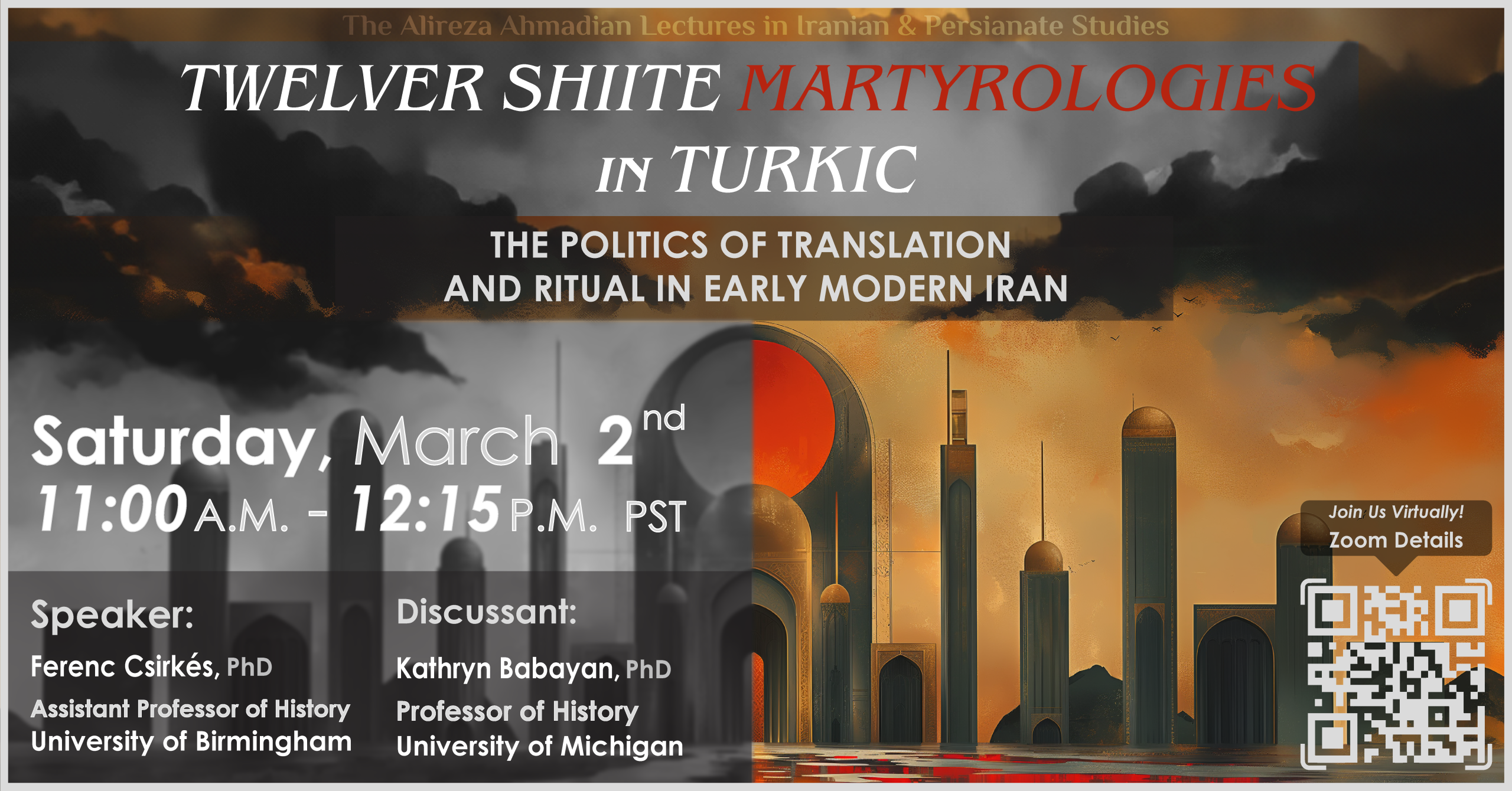
Thursday, January 25, 2024 (Online – in English)
The Persianate Understanding of Japan: The Reach and Limits of Inter-Asian Exchange
Speaker: Nile Green, PhD | Ibn Khaldun Endowed Chair in World History | University of California in Los Angeles
Discussant: Aria Fani, PhD | Assistant Professor | Elahé Omidyar Mir-Djalali Professorship in Persian and Iranian Studies | University of Washington
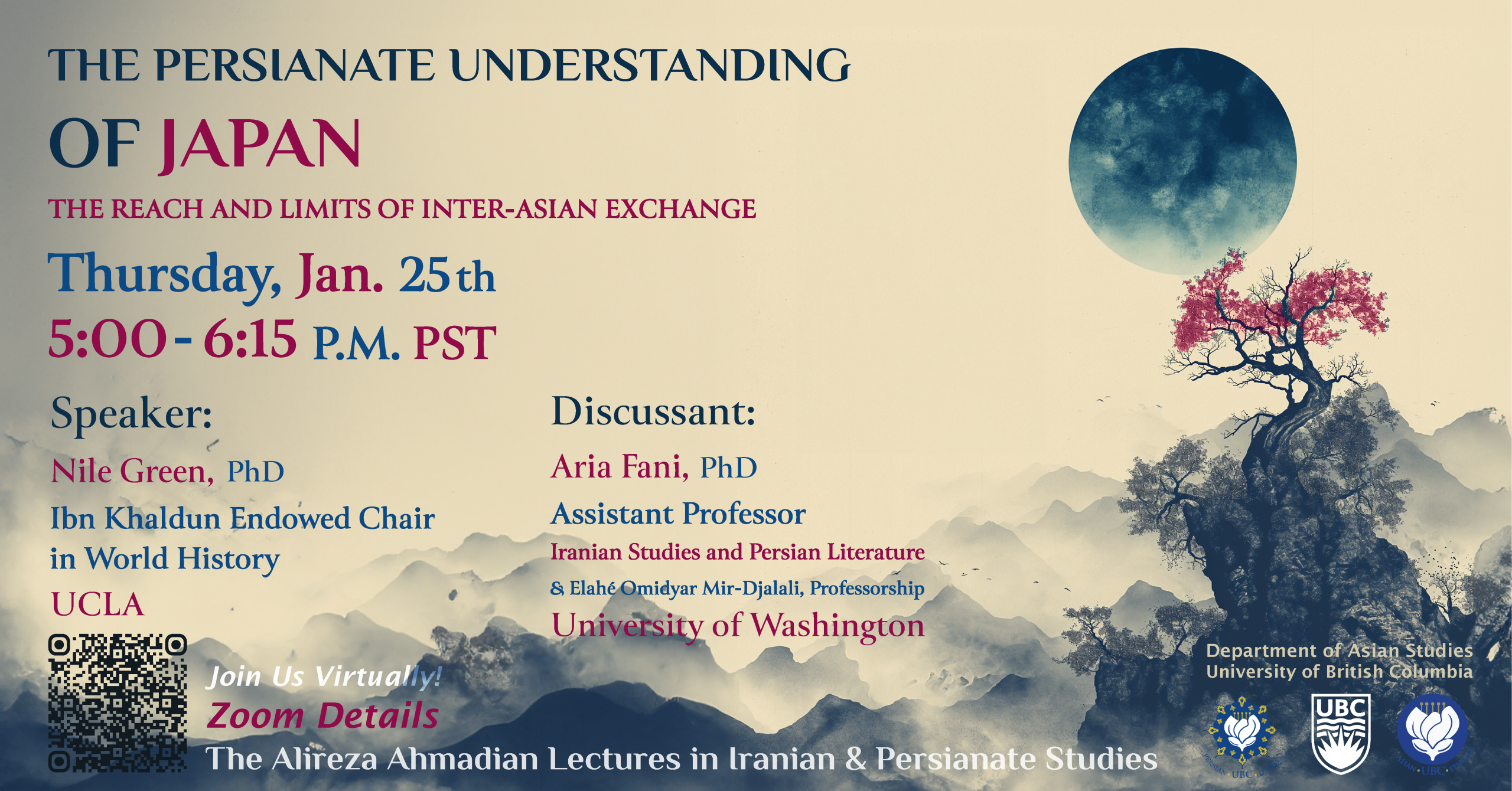
Saturday, December 9, 2023 (Online – in Persian)
Exploring “Liku”: Baluchi Folk Poetry’s Brief Beauty
Speaker: Mr. Mansour Alimoradi | Writer and Independent Researcher
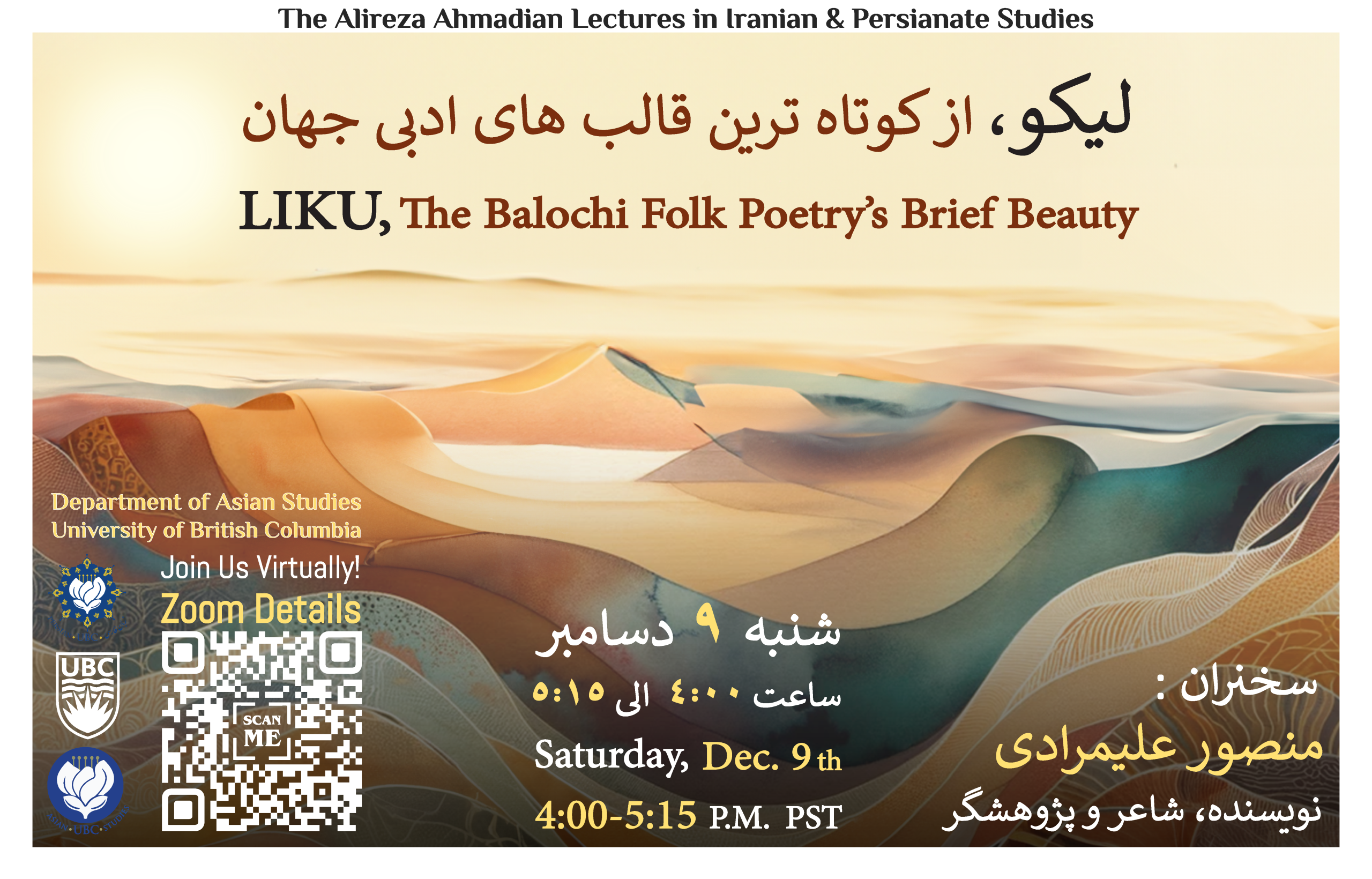
Friday, December 1, 2023 (Online/In-Person at C.K. Choi – in English)
Intermixture in Persian Epics: The Case of Kush, the Elephant-Eared
Speaker: Alexandra Hoffmann, PhD | Assistant Professor of Classical Persian Literature and Culture | UBC
Discussant: Cameron Cross, PhD | Assistant Professor of Iranian Studies | University of Michigan (Dr. Cross will be joining on Zoom.)
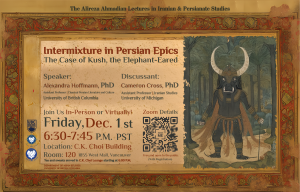
Saturday, November 25, 2023 (Online – in English)
Lament of the Ages: Memory, Voice, and Experience with the Dotāris of Torbat-e Jām
Speaker: Marie Huber, PhD | Assistant Professor of Persian and Comparative Literature | Division of Literatures, Cultures, and Languages | Stanford University
Discussant: Domenico Ingenito, PhD | Associate Professor of Iranian Studies and Persian Literature | Department of Near Eastern Languages & Cultures | UCLA
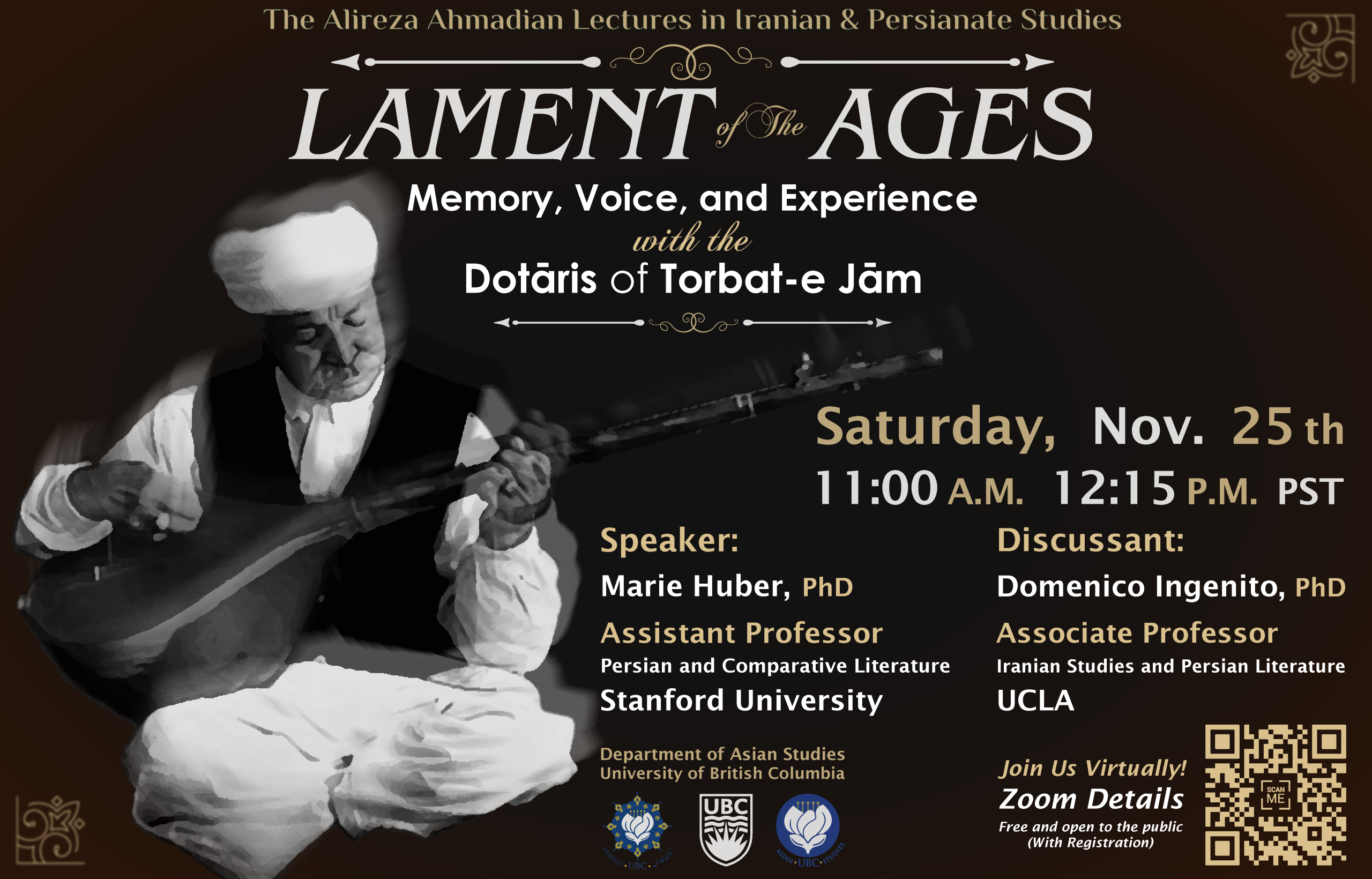
Saturday, December 3, 2022 (Online – in English)
“Dressed in the Costume of His Country:” Portraits of Persians Done in the West, 1600–1842
Speaker: Daniel T. Potts, PhD, Professor of Ancient Near Eastern Archeology and History, New York University
Discussants: Layla Diba, PhD, Art Historian, Independent Scholar; Willem Floor, PhD, Iran Historian, Independent Scholar
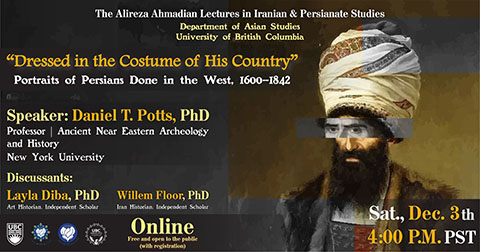
Saturday, November 19, 2022 (Online – English)
Art and Spatial Politics in Iran
Speaker: Pamela Karimi, PhD, Professor of Art History & Interim Chair College of Visual and Performing Arts University of Massachusetts Dartmouth
Discussant: Houchang Chehabi, PhD, Honorary Professor in the School of History of the University of St. Andrews
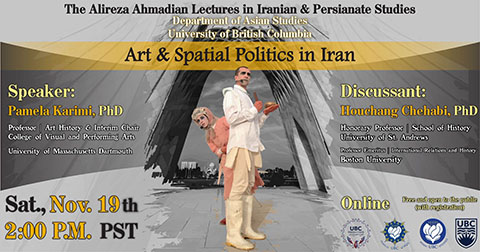
Friday, October 14, 2022 (UBC Robson Square – in English)
Gardens in Persian Literature: Ecology of Material and Metaphysical Beauty, from Balkh to Shiraz
Speaker: Domenico Arturo Ingenito, PhD, Associate Professor of Persian Literature at the University of California, Los Angeles
This talk was cancelled due to unforeseen circumstances.
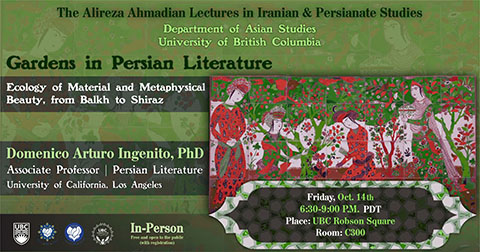
Saturday, June 18, 2022 (Online – in English)
The Impossible Gift of Sense in Rahnavard Zaryāb’s “The Snakes Under the Silverberry Trees”
Speaker: Hessam Dehghani, PhD, Assistant Professor of Teaching, Persian Language and Culture, University of British Columbia
Discussant: Mujib Mehrdad, Writer and poet, Kabul
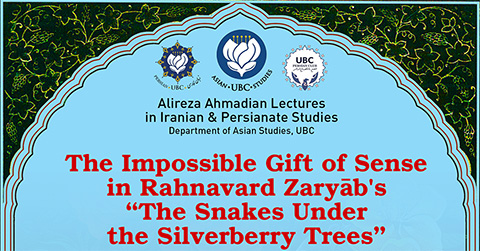
Saturday, May 28, 2022 (Online – in English)
The Indian Connection in Hedayat’s The Blind Owl
Speaker: Marta Simidchieva, PhD, Faculty of Liberal Arts & Professional Studies, York University
Discussant: Nadeem Akhtar, PhD, Visiting Faculty of Persian, Department of History, Ashoka University
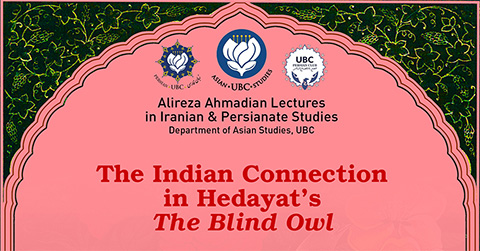
Saturday, May 14, 2022 (Online – in English)
Weaving Femininity into Mysticism: Rereading Parvīn Iʿtiṣāmī’s “God’s Weaver”
Speaker: Behnam M. Fomeshi, PhD, Research Fellow, Monash University
Discussant: Marie Huber, PhD, Assistant Professor of Persian and Comparative Literature, Stanford University
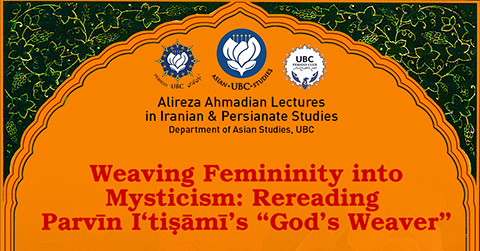
Saturday, April 2, 2022 (Online – in English)
The Persian Prison Poem from South Asia to the Caucasus: Towards an Anthology
Speakers: Rebecca Gould, PhD, Professor and Professorial Research Fellow, Islamic World and Comparative Literature, University of Birmingham; Kayvan Tahmasebian, PhD, Research Associate, GlobalLit, University of Birmingham
Discussant: Samuel Hodgkin, PhD, Assistant Professor of Comparative Literature, Yale University
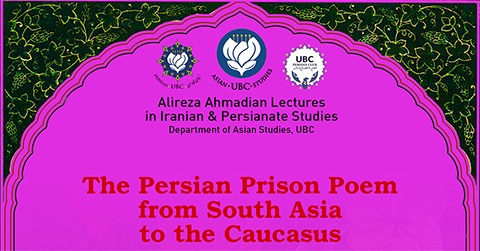
Saturday, March 5, 2022 (Online – in English)
Molla Nasreddin of Tiflis and the Transnational Diasporic Milieu that Gave Birth to It, 1906-1931
Speaker: Janet Afary, PhD, Professor and Mellichamp Chair in Global Religion, UC Santa Barbara
Discussant: Hasan Javadi, PhD, Retired Academic, University of California, Berkeley
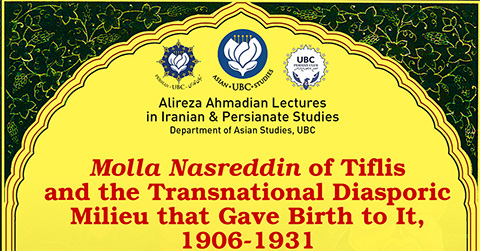
Saturday, February 26, 2022 (Online – in English)
The Changing Diet of the Iranians – From Quasi-Vegetarians to Quasi-Carnivores
Speaker: Willem Floor, PhD, Iran Historian
Discussant: Nader Mehravari, PhD, College of Agriculture and Environmental Sciences, University of California, Davis
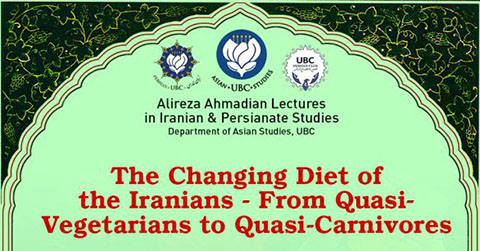
Saturday, February 5, 2022 (Online – in Persian)
Representations of Ethnicity in Iranian Young Adult Fiction
Speaker: Farzaneh Aghapour, PhD, Assistant Professor of Persian Literature, University of Guilan
Discussant: Soudabeh Shokrollah-Zadeh, PhD, Assistant Professor of Education, Allameh Tabataba’i University
This talk was cancelled due to unforeseen circumstances.
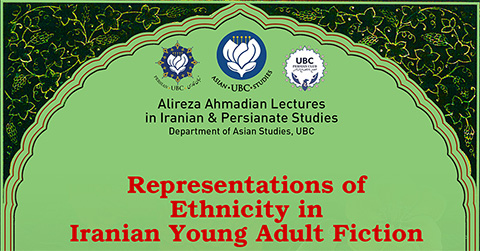
Saturday, December 18, 2021 (Online – in English and Persian)
The Hidden Story of One Thousand and One Nights in Persian: Muhammad Baghir Khurasani’s “Tarjumah Hinrīyah” Patronized in Hyderabad
Speakers: Mehdi Ganjavi, PhD – Scholar, Writer, Editor, Robarts Library, University of Toronto; Meisam Alipour, MA in Art Studies, University of Tehran; Novelist
Discussant: Pegah Shahbaz, PhD, SSHRC Postdoctoral Fellow, Centre for South Asian Studies (CSAS), Asian Institute Munk School of Global Affairs and Public Policy, University of Toronto
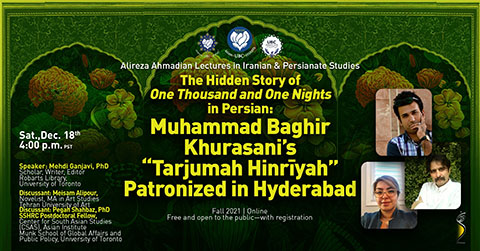
Saturday, December 4, 2021 (Online – in English)
New Insights from the East on Poetry and Politics: The Reconciliatory Thought of Sa‘di Shirazi
Speaker: Iman Ahmadian, PhD – Research Associate, University of Newcastle
Discussant: Hessam Dehghani, PhD – Assistant Professor of Teaching, Persian Language and Culture, University of British Columbia
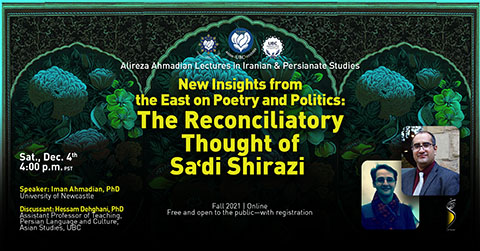
Saturday, November 20, 2021 (Online – in English)
Beholding Beauty: Sa‘di’s Quest for Lyric Experience and Mystical Eroticism in the Golestān and the Ghazals
Speaker: Domenico Ingenito, PhD – Associate Professor of Persian Literature at the University of California, Los Angeles
Discussant: Justine Landau, PhD – Associate Professor of Near Eastern Languages and Civilizations, Harvard University
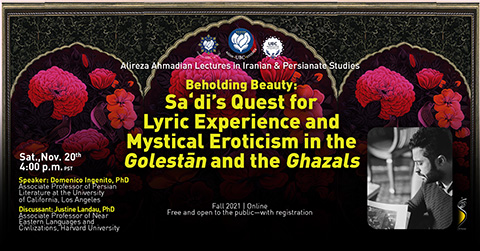
Saturday, November 6, 2021 (Online – in English)
The Anti-Aryan Moment: Decolonization and Race in Late Pahlavi Iran
Speaker: Firoozeh Kashani-Sabet, PhD – Professor of History, University of Pennsylvania
Discussant: Barrington Walker, PhD – Professor of History, Wilfrid Laurier University
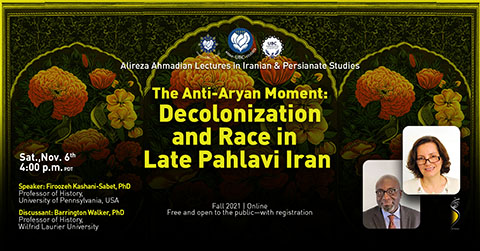
Saturday, October 23, 2021 (Online – in English)
Say What Your Longing Heart Desires: Women, Prayer and Poetry in Iran
Speaker: Niloofar Haeri, PhD – Professor of Anthropology, Johns Hopkins University
Discussant: Mahtab Sirdani, PhD Candidate – Sociocultural Anthropology, Boston University
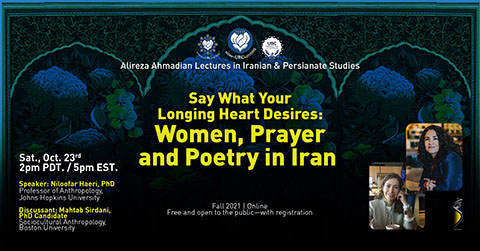
Saturday, October 16, 2021 (Online – in English)
Social Media, Music, and Poetic Worldmaking in Iranian Publics
Speaker: Nahid Siamdoust, PhD, Assistant Professor of Media Studies and Middle East Studies, University of Texas at Austin
Discussant: Niki Akhavan, PhD, Associate Professor, Media and Communication Studies, The Catholic University of America
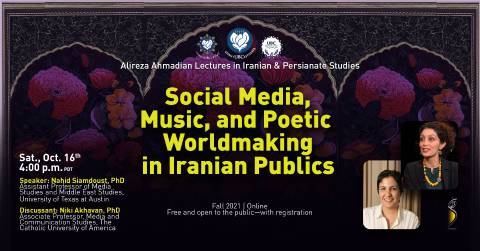
Saturday, October 2, 2021 (Online – in English)
Reflections on the Story of Ali in Sunni Islam
Speaker: Nebil Husayn, PhD – Assistant Professor, Department of Religious Studies, University of Miami
Discussant: Javad T. Hashmi, MD – Fellow Medical Ethics, Harvard Medical School, PhD candidate in Islamic Studies, Harvard University
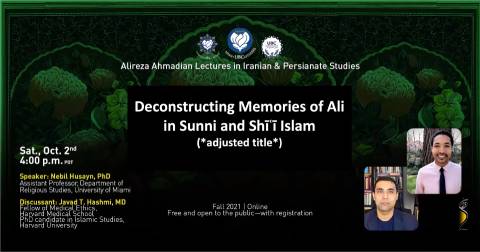
Saturday, September 25, 2021 (Online – in English)
Production and Circulation of Post-revolutionary Iranian Literature
Speaker: Laetitia Nanquette, PhD – Senior Lecturer, University of New South Wales, Sydney
Discussant: Amy Motlagh, PhD – Associate Professor of Comparative Literature and Middle East and South Asian Studies, University of California, Davis
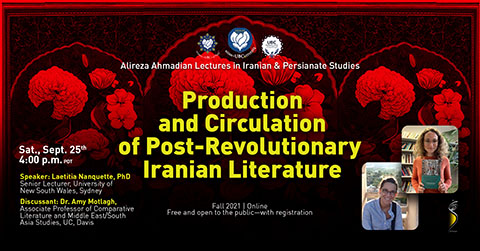
Saturday, July 24, 2021 (Online – in English)
Afghans in the Persianate Age
Speaker: Naveena Naqvi, PhD, Assistant Professor, Persianate Islamic Cultures of South Asia, University of British Columbia
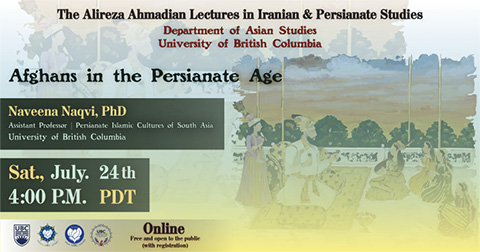
Saturday, May 29, 2021 (Online – in English)
Earthly or Ethereal? The Beloved in Classical Persian Poetry
Speaker: Mahdieh Vali-Zadeh, PhD Candidate in Comparative Literature, University of Toronto
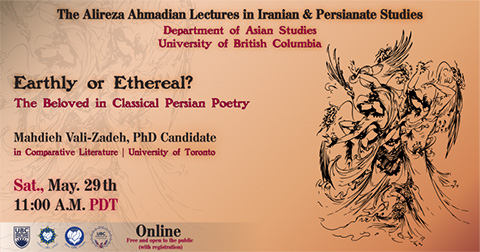
Saturday, May 15, 2021 (Online – in English)
Iranian Women as Theatre-Makers: Witnesses and Whispers
Speaker: Marjan Moosavi, PhD, Roshan Lecturer, University of Maryland
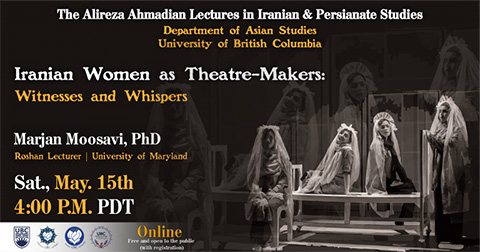
Saturday, April 24, 2021 (Online – in English)
Literature Against Propaganda: Counter Discourse and Symbolic Resistance in Iran-Iraq War Fiction
Speaker: Salour Malayeri, PhD in Modern Languages, University of St. Andrews
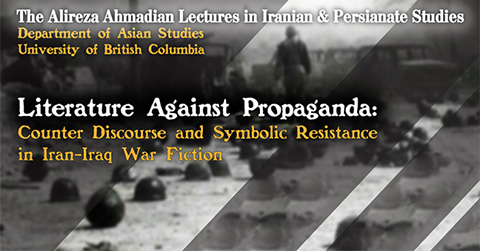
Saturday, April 10, 2021 (Online – in Persian)
Intertextuality or Plagiarism? Sadeq Hedayat’s The Blind Owl from a Cognitive Poetics Lens
Speaker: Leila Sadeghi, PhD in Linguistics, University of Tehran
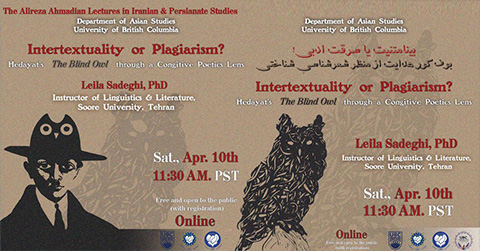
Saturday, March 27, 2021 (Online – in English)
Genre Fiction and Narrative Epistemologies: The Case of Detective Fiction in Persian
Speaker: Omid Azadibougar, PhD, Hunan Normal University, China
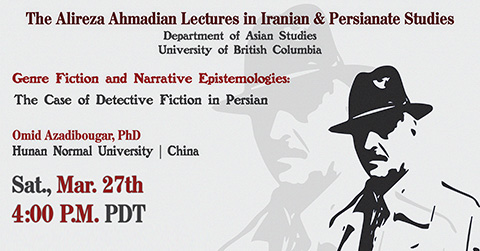
Saturday, March 13, 2021 (Online – in English)
Degenerate, Popular, and Forgotten? Politicization and Monetization of Urban Entertainment in Pahlavi Iran
Speaker: Ida Meftahi, PhD, Assistant Professor of History, Boise State University
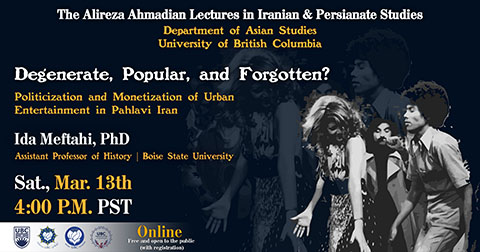
Saturday, February 27, 2021 (Online – in English)
Social Media, Music and Poetic Worldmaking in Iranian Publics and Counterpublics
Speaker: Nahid Siamdoust, PhD, Visiting Assistant Professor of Women’s Studies and Anthropology of Religion, Harvard Divinity School
This talk was cancelled due to unforeseen circumstances.
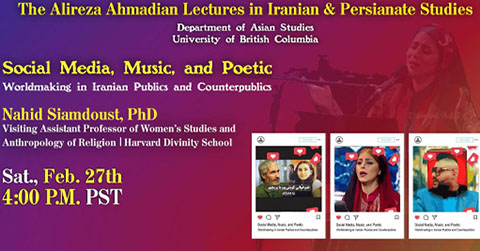
Saturday, February 13, 2021 (Online – in English)
Raz-i Nuw: Hossein Alizadeh and the Possibility of a Persian Musical Modernity
Speaker: Morteza Abedinifard, PhD Candidate in Musicology, University of Alberta
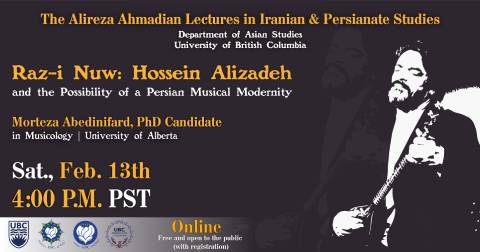
Saturday, January 30, 2021 (Online – in English)
The Iranian Nightmare: Theorizing a New Iranian Horror Cinema in the (Trans) National Circuitry, 2009-2019
Speaker: Farshid Kazemi, PhD, Postdoctoral Fellow, Simon Fraser University
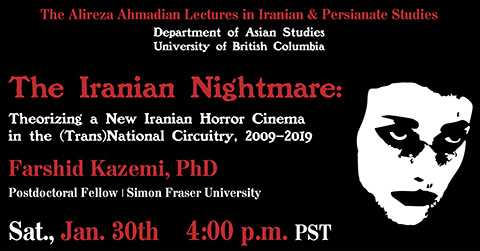
Saturday, January 16, 2021 (Online – in English and Persian)
#Me_Too and the Valuing of Gendered Violence in Iran
Speakers: Ali Jenaban (Filmmaker), Elham Naeej (PhD, University of New South Wales, Australia) and Amin Pourbarghi (Filmmaker)
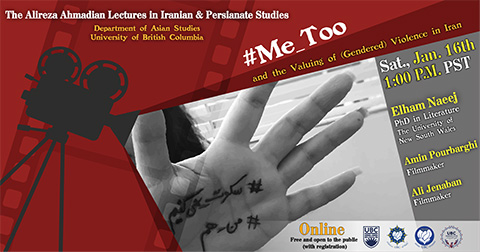
Saturday, December 12, 2020 (Online – in English)
Negotiating Modernity: The Prostitute Character in Iranian Film and Fiction
Speaker: Maryam Zehtabi Sabeti Mogaddam, PhD, University of Massachusetts, Amherst
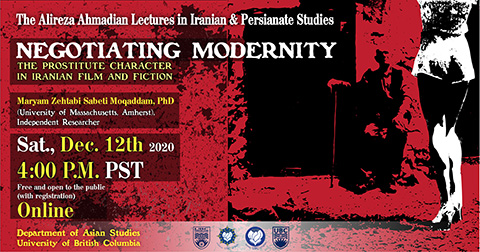
Saturday, November 28, 2020 (Online – in English)
Persian, Pahlavi, and Teaching Farsi
Speaker: Rastin Mehri, PhD, Lecturer at Language Training Institute, University of Simon Fraser
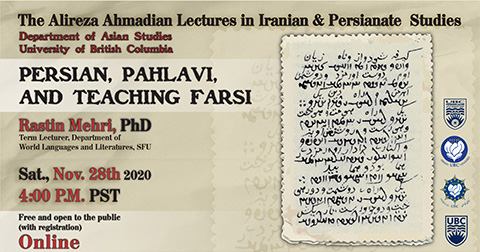
Saturday, November 14, 2020 (Online – in English)
Representation of Sigheh Women in Modern Iranian Cultural Productions
Speaker: Claudia Yaghoobi, PhD, Roshan Institute Associate Professor in Persian Studies, University of North Carolina at Chapel-Hill
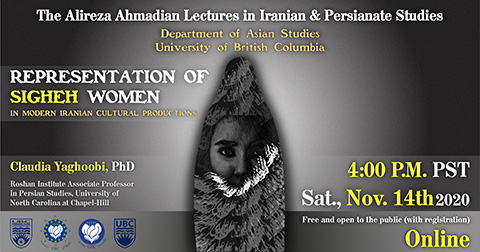
Saturday, October 31, 2020 (Online – in English)
The Poetics and Politics of Representation: A Comparative Study of “Simurgh” In Four Royal Manuscripts of the Shahnama
Speaker: Behrang Nabavi Nejad, PhD, Art History Instructor, Columbia College, Vancouver
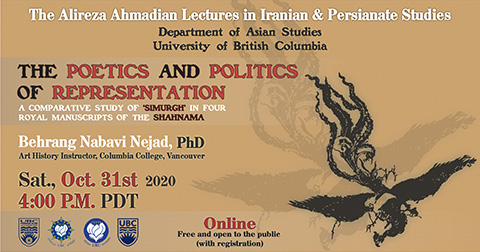
Saturday, October 17, 2020 (Online – in English)
No Heaven For Gunga Din (1965) From Speculative Fiction to Decolonial Option
Speaker: Amirhossein Vafa, PhD, Assistant Professor of English and Comparative Literature, Shiraz University
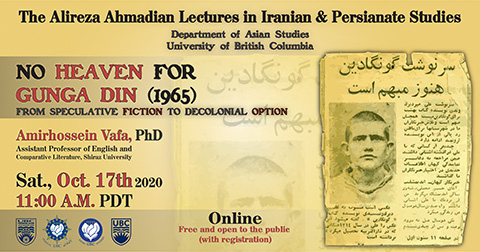
Saturday, September 26, 2020 (Online – in English)
Pondering Anti-Blackness in the Iranian Context, From Enslavement to the Present
Speaker: Amy Tahani-Bidmeshki, PhD, Assistant Professor, English Division, Pasadena City College, California
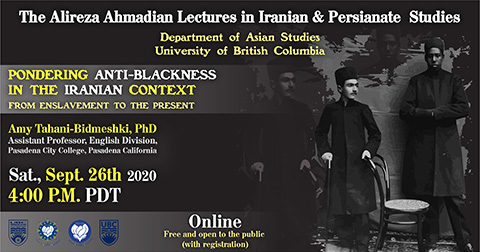
Friday, April 3, 2020 (C. K. Choi Building – in English)
The Wisdom of Love: Hafez, Goethe and World Literature
Speaker: Azadeh Yamini-Hamedani, PhD, Associate Professor of World Literature, Simon Fraser University
This talk was cancelled due to unforeseen circumstances.
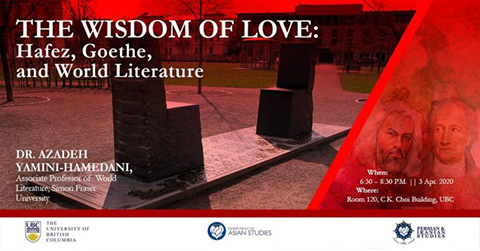
Friday, March 13, 2020 (C. K. Choi Building – in English)
Persian, Pahlavi and Teaching Farsi
Speaker: Rastin Mehri, PhD, Lecturer at Language Training Institute, University of Simon Fraser
This talk was cancelled due to unforeseen circumstances.
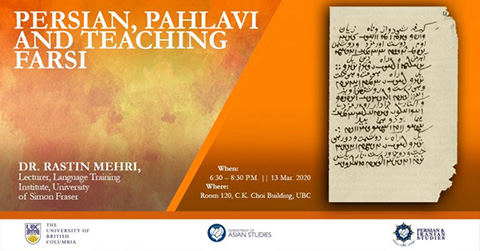
Wednesday, February 12, 2020 (C. K. Choi Building – in English)
Persian Munshi, Persian Jones: English Translations of Sa’di’s Gulistan from Late 18th to Mid-19th Centuries
Speaker: Pegah Shahbaz, PhD, SSHRC Postdoctoral Fellow, Department of Asian Studies, UBC
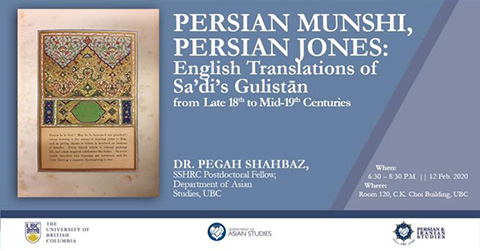
Friday, January 31, 2020 (C. K. Choi Building – in Persian)
The Persian Influences on the Architecture of the Mugal Empire
Speaker: Razieh Rahimi, PhD in Architecture, Savitribai Phule Pune University, India
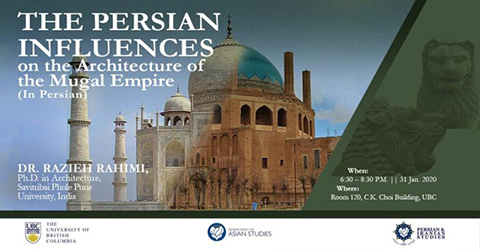
Friday, January 17, 2020 (Asian Centre Auditorium – in English)
Cinema and the City: Film and Urban Iran in the Early 20th Century
Speaker: Golbarg Rekabtalaei, PhD, Assistant Professor of History, Seton Hall University
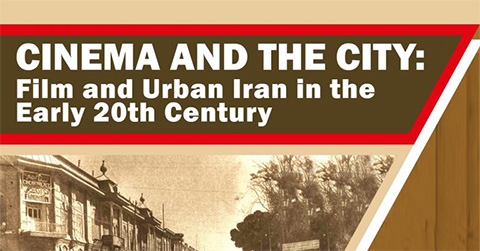
Friday, November 29, 2019 (C.K. Choi Building – in English)
Civilizational Contacts between Ancient Iran and Europe during the Classical Era
Speaker: Kaveh Farrokh, PhD, Professor of History & Academic Advisor for Analytica Iranica, Methodolgica Governance University, Paris, France
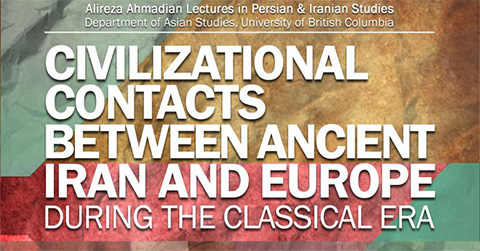
Friday, November 8, 2019 (C.K. Choi Building – in English)
Political Economy of Oil Despotism: The Case of Post-Revolutionary Iran
Speaker: Morteza Asadi, PhD, Visiting Scholar at the School of International Studies, Simon Fraser University, Vancouver, BC; former Assistant Professor of Economy at Kharazmi University, Tehran
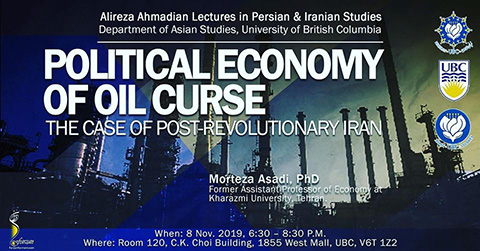
Friday, October 25, 2019 (C.K. Choi Building – in Persian)
Iranian Art After Islam: With a Look at Some Renowned Calligraphers
Speaker: Farzan Kermani, PhD in Design, IIT Bombay
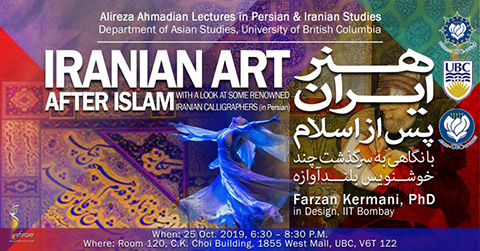
Friday, October 11, 2019 (C.K. Choi Building – in English)
Imagining Time in India: Persian Chroniclers and their Interpreters
Speaker: Shahzad Bashir, PhD, Aga Khan Professor of Islamic Humanities Professor of Religious Studies, Brown University
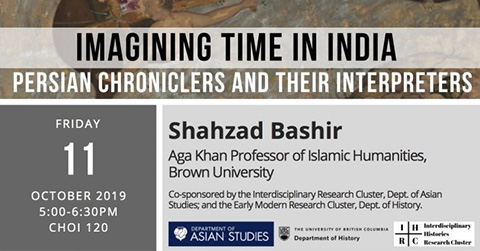
Friday, October 4, 2019 (Asian Centre Auditorium – in English)
Zarathustra the Philosopher
Speaker: Dr. Tooraj Khodabakhshi, Dentist and Mobed (Zoroastrian Priest)
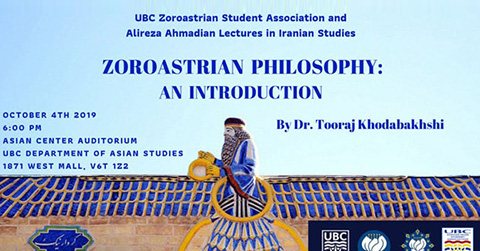
Friday, September 27, 2019 (UBC Robson Square – in English)
One Poet Among Many: Hafez and the Transregional Literary Networks of 14th-Century Iran
Speaker: Dominic Parviz Brookshaw, PhD, Associate Professor of Persian Literature, University of Oxford
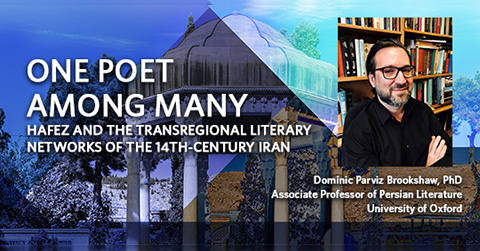
Friday, September 13, 2019 (C.K. Choi Building – in Persian)
Loneliness and Struggle: Self-Narratives of Iranian Trans People’s Lives
Speaker: Mahsa Rad, PhD Candidate in Psychology, Tarbiat Modares University, Tehran; Visiting International Research Student at UBC
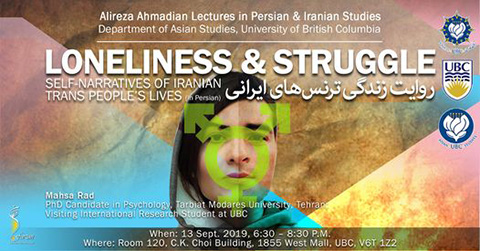
Friday, March 29, 2019 (C.K. Choi Building – in Persian)
Classical Persian Literature as a Mirror of Past Gender Orders
Speaker: Azadeh Mokhtarnameh, PhD, Former Lecturer of Persian Language and Literature at Shiraz University, Iran
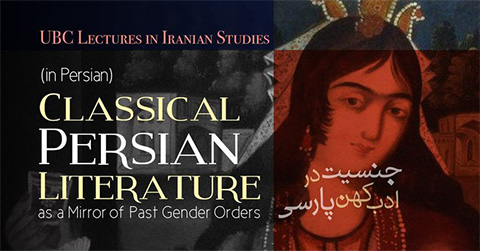
Friday, March 22, 2019 (C.K. Choi Building – in Persian)
The Woman through the Safavid Texts and Documents
Speaker: Nozhat Ahmadi, PhD, Associate Professor of History, University of Isfahan
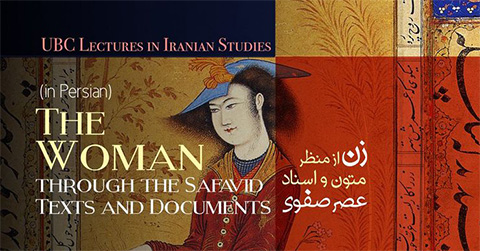
Friday, March 15, 2019 (Asian Centre Auditorium – in Persian)
Articulations of Identity in the Iranian Diaspora
Speaker: Nojang Khatami, PhD Candidate, Sessional Lecturer & Vanier Scholar, Political Science, UBC
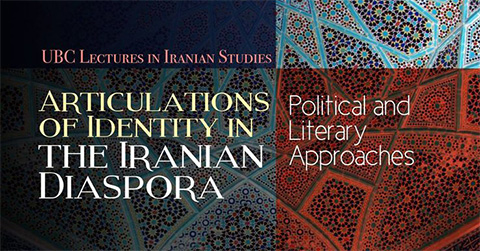
Friday, March 1, 2019 (C.K. Choi Building – in Persian)
I, Kambiz Sharif: A Talk and Book-Signing
Speaker: Kambiz Sharif, Sculptor
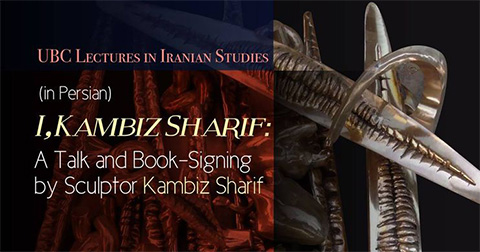
Friday, February 8, 2019 (Asian Centre Auditorium – in English and Persian)
Iranian Music After the 1979 Revolution
Amir Eslami: Musician and Composer; Former Senior Lecturer at Tehran University of Art, along with musician Hamin Honari.
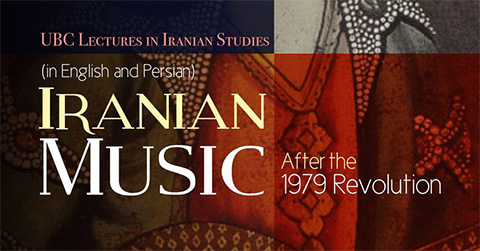
Friday, January 25, 2019 (C.K. Choi Building – in English)
Parviz Tanavoli: Poetry in Bronze (Film Screening/Q&A)
Documentary screening, followed by Q&A between the director and the artist; Terrence Turner: Canadian filmmaker; Parviz Tanavoli: Iranian-Canadian sculptor.
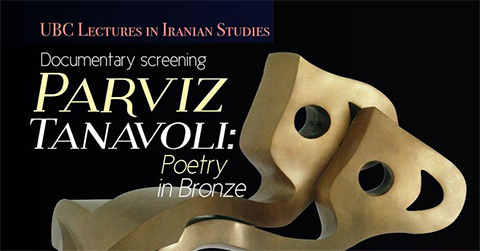
Friday, January 16, 2019 (Jack Poole Hall, Robert H. Lee Alumni Centre – in English)
Modernizing the Persian Masterpiece, Shahnameh
Artist Hamid Rahmanian explains how he turned Shahnameh into an art book, audio-book, pop-up and play.
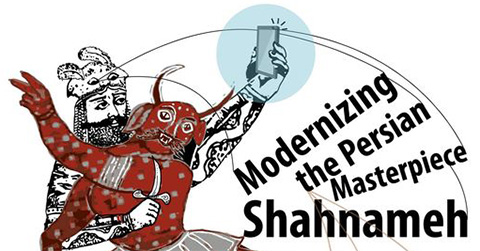
Thursday, November 8, 2018 (Asian Centre Auditorium – in Persian)
On Declining and Desiring Nostalgia
Speaker: Mohsen Namjoo, Iranian Singer – Songwriter, Music Scholar and Setar (traditional Persian lute) player currently based in New York City, invited to UBC by the Asian Studies Department and UBC Persian Club.
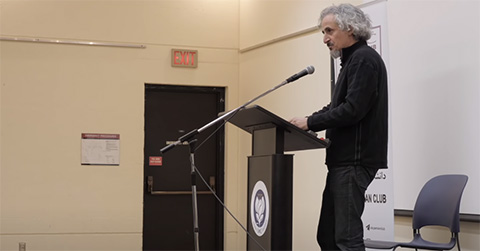
In Memoriam: Alireza Ahmadian (22 Feb, 1981 – 28 June, 2019)
UBC’s Asian Studies’ faculty, staff and students were saddened to hear of the recent passing of Alireza Ahmadian. Alireza was a passionate supporter of our initiative to establish Persian Language and Iranian Studies within the Department, with which he first became acquainted in 2010 as an enthusiastic undergraduate student.

Alireza pictured here second-from-right at a 2018 UBC Persian Alumni Event

Alireza at front row, left, at UBC’s first Persian Studies lecture with guest speaker Abbas Milani
Our Head of Department, Professor Ross King, says: ”Alireza was a devoted and trusted advisor, supporter, confidant and friend. My colleagues in Asian Studies, the Dean’s Office, and the Office of Development and Alumni engagement could never say enough good things about his charisma, his passion, his articulate and insightful analyses of Vancouver’s Iranian community, and above all his warm and generous humanity.
He can never be replaced, but we sincerely hope other young people in the Vancouver Iranian community will follow his selfless activist example and help us continue our efforts to put Persian language and Iranian Studies at UBC on a permanent footing.”
May he rest in peace.
Video: UBC Department of Asian Studies
Widely acknowledged as one of the finest in North America, we are the flagship Asian Studies department in Canada. Five professors share their knowledge of the History, Culture, and Language of Asia.
